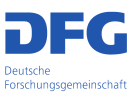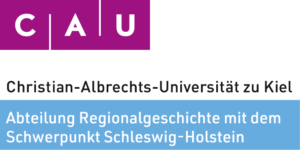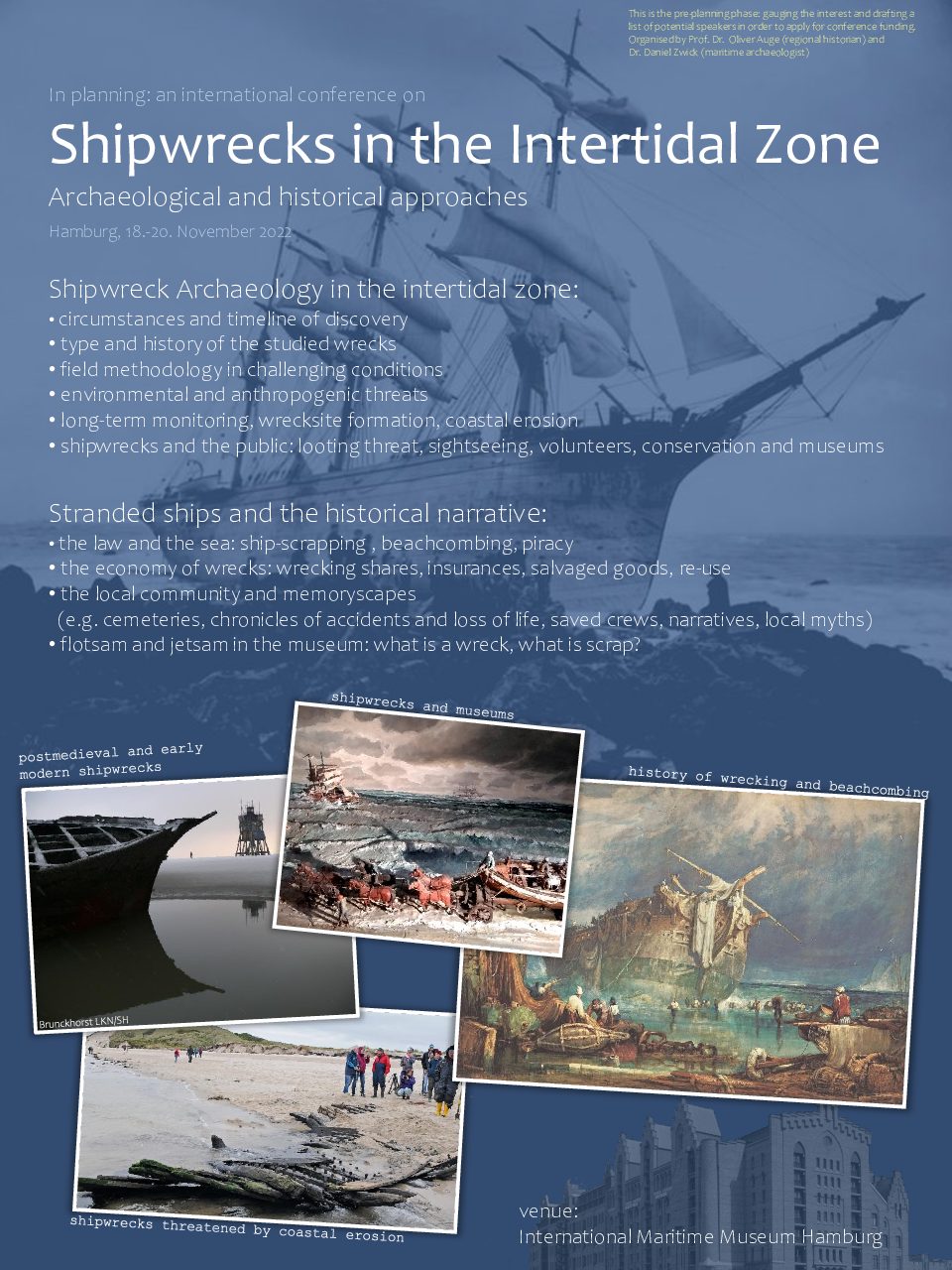Website: https://intertidal-shipwrecks.de/
Last update: The conference grant application was accepted by the German Research Foundation (DFG) on 14.4.22 and the conference will take place. The list of speakers is finalised, but contributions for the digital poster presentation can still be accepted. With the exception of the public keynote lecture by Prof. Dr. Jerzy Gawronski on “Docking the Amsterdam” on November 18 at the Museum für Hamburgische Geschichte, the conference programme is not open to the public. But it is planned to broadcast it as live conference, so that anyone interested could at least join digitally. Please watch this site for updates.
Date: 18.-20. November 2022
Conference venue: International Maritime Museum Hamburg
Organisers: Prof. Dr. Oliver Auge (University of Kiel), Dr. Ulf Ickerodt (State Archaeology Department of Schleswig-Holstein) and Dr. Daniel Zwick (corresponding organiser)
Summary: This conference has an interdisciplinary focus, involving the fields of archaeology, history, museums, cultural heritage management and marine geomorphology, dealing with the practicalities of wreck research, methods & technology in the challenging tidal environment, the legal protection as well as environmental threats to the in situ protection. Similtaneously, narratives connected to wrecksites are highly relevant, e.g. testimonies of survivors, wreckers and beachcombers, local myths, and the public engagement with the sites today through public outreach and museums. In the light of a growing number of spectacular wreck discoveries in tidal foreshore areas all over the globe, like in Wales, Germany, Spain, Portugal, the USA, Australia, and New Zealand (to name only few examples), we feel this would be a highly topical conference, which would facilitate an exchange of ideas across different disciplines. This 2-day conference shall take place on 18.-20. November 2022 in the International Maritime Museum of Hamburg (IMMH). Hamburg would be a perfect setting for a maritime-themed conference, with regard to the (reasonably) recent opening of the International Maritime Museum Hamburg in the Speicherstadt, the world-largest warehouse disctrict (built 1883-1927) which became a UNESCO World Heritage site in 2015, as well as the ongoing establishment of the Hamburg Port Museum with the four-masted barque PEKING (built 1911), which was recently brought from New York to Hamburg.
List of speakers:
- Dr. Dan Atkinson (Wessex Archaeology Scotland): The Fuday wreck: Evidence of a northwest European trading vessel from the 16th-17th century discovered in the Scottish Outer Hebrides
- Prof. Dr. Oliver Auge & Henning Andresen (Universität Kiel): “Strandordnungen” in early modern Schleswig-Holstein and their historical context
- Dr. Kurt Bennett (Heritage New Zealand): The “Daring” Rescue: The story of New Zealand’s best preserved mid-19th century schooner
- Stefan Brenner (Universität Kiel): Between Beach Rights and Beach Robbery – the Lower Elbe as a Conflict Area in the 13th and 14th Centuries
- Brendan Burke (Virginia Department of Historic Resources): An Inspiring and Inclusive History: The Nansemond Ghost Fleet of Suffolk, Virginia
- Dr. Tom Dawson & Dr. Joanna Hambly (St. Andrews University): Boat Graveyards in Scotland
- Dr. Brad Duncan (University of New England & Heritage New South Wales): Now you see it, Now you don’t! : Intertidal maritime archaeology and management in coastal and riverine areas, New South Wales, Australia
- Alec Ewing, & Corina Hordijk (Stichting Texels Museum): Musealization of rare and clandestine textiles from Texel’s Palmwood Wreck
- Prof. Dr. Jerzy Gawronski (Docking the Amsterdam Foundation, Amsterdam): Docking the Amsterdam (1749). From an intertidal shipwreck to a public excavation
- Dr. Florian Huber (Submaris): Stranded in paradise: The German Raider SMS Seeadler in French Polynesia
- Dr. Jennifer Elizabeth Jones (East Carolina University): Tides of change: coastal geomorphology and the management of shipwrecks on beaches
- José Manuel Matés Luque (Arqueocean): Removing the mud from forgotten wrecks in the intertidal zone in the Basque Country, Spain
- Dr. Chuck Meide (Lighthouse Archaeological Maritime Program): “Skeletons of Foundered Ships”: Intertidal Shipwrecks of St. Augustine, Florida, America’s Oldest Port
- Prof. Dr. Cathryn Pearce (University of Portsmouth): Neither Hero nor Victim: Intertidal Shipwreck Events and Responses of Coastal Communities in 19th Century Britain
- Dr. Christopher Jacob Ries (Strandingsmuseum St. George): Wrecks, farmers and fishermen: the beginnings of commercial diving on the Danish West Coast 1830 – 1910
- Cécile Sauvage (Département des recherches archéologiques subaquatiques et sous-marines, DRASSM): Saint-Pierre-et-Miquelon (France): The archipelago of shipwrecks, from myth to study
- Robert Shaw (The Discovery Programme, Centre for Archaeology and Innovation Ireland): The CHERISH project: Investigating the impacts of climate change on intertidal wrecks
- Andy Sherman (Museum of London Archaeology): CITiZAN: shipwrecks and smartphones, the rapid recording of vessels in the intertidal zone
- Michael Wesemann (Niedersächsisches Landesamt für Denkmalpflege) & Dr. Mike Belasus (NihK): Brief Encounters – Wreck Investigations in the Inter-Tidal Zone of Lower Saxony’s Wadden Sea 2006 – 2019
- Dr. Julian Whitewright (The Royal Commission on the Ancient and Historical Monuments of Wales, RCAHMW): The inter-tidal shipwrecks of Wales: Challenges and Opportunities
- Dr. Jann Markus Witt (Deutscher Marinebund): From ship to wreck
- PD. Dr. Gabriel Zeilinger (Universität Erlangen-Nürnberg & Deutsches Schifffahrtsmuseum): Shipwreck in Medieval and Early Modern Times: On the history of maritime risk-taking conserved in language, writing and objects
- Dr. Daniel Zwick (Archäologisches Landesamt Schleswig-Holstein, ALSH): The Riddle of the Shifting Sands: The historic shipwrecks of the North Frisian Wadden Sea exposed by coastal erosion
List of contributors to the digital poster presentation:
to be updated asap
Organisations involved:











